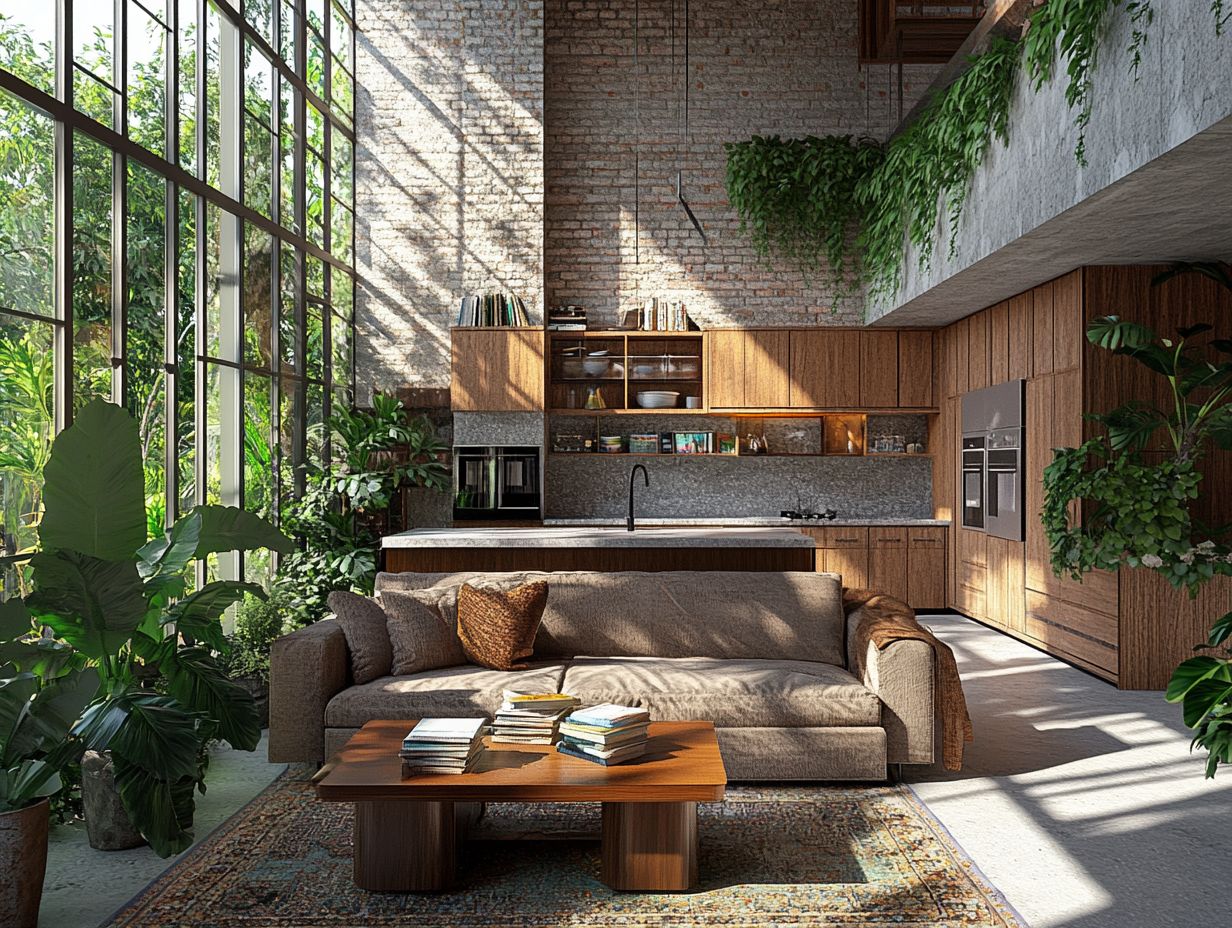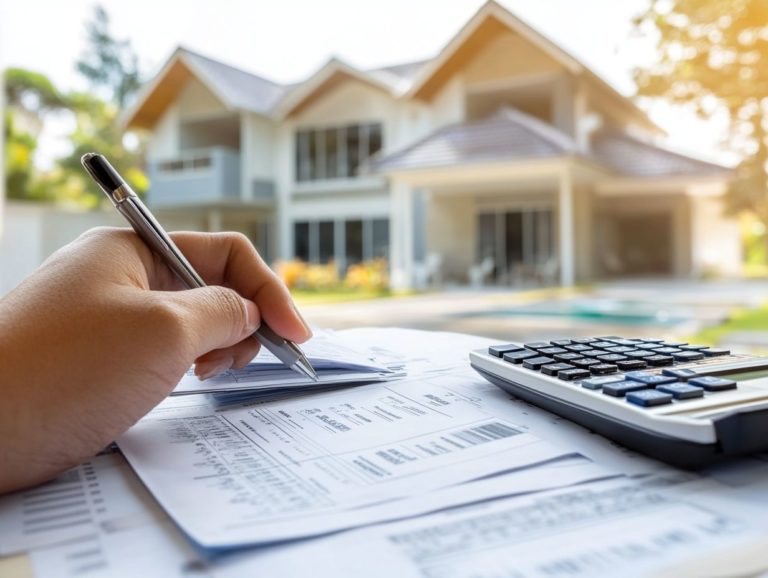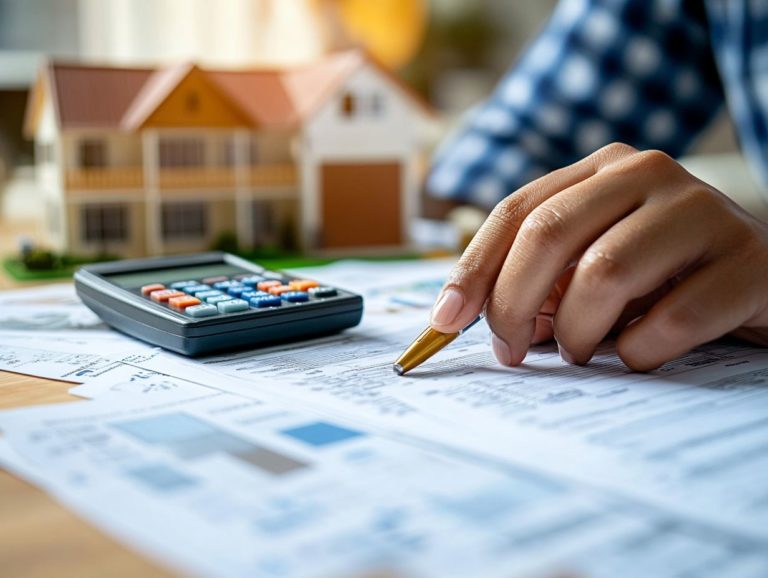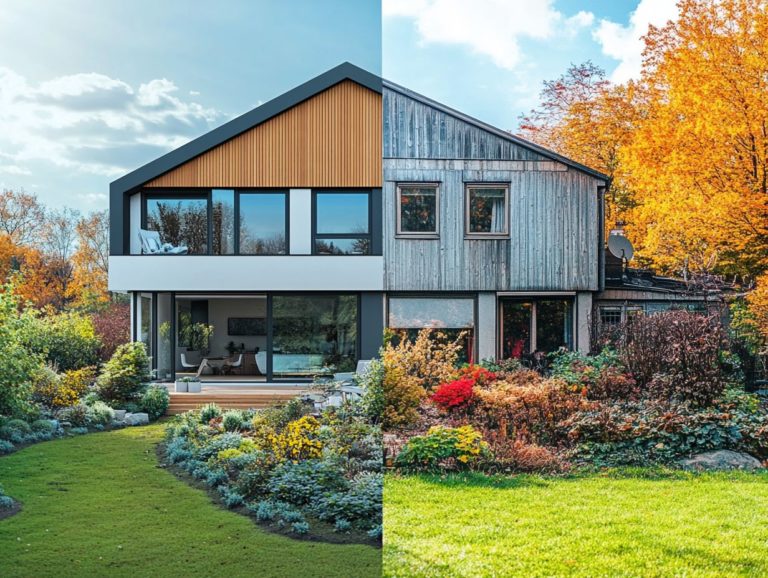What Should I Look for in a Home?
Navigating the home-buying process may seem daunting, but recognizing your specific needs and desires is the essential first step.
This article clearly explains everything you should consider, from pinpointing your priorities and selecting the ideal location to managing your budget effectively. It delves into the important role of a real estate agent, underscores the significance of home inspections, and guides you through the process of making a successful offer.
By the conclusion, you will possess the insights necessary to make informed and confident decisions in your home search. Get ready to embark on your home-buying adventure with confidence!
Contents
Key Takeaways:

Identify your priorities and needs before starting your home search.
Think about location, size, and condition these are game-changers!
Calculate your budget realistically to determine the affordability of a home.
Remember to include extra costs beyond the listing price.
Work with a trusted real estate agent to guide you through the home-buying process. They can provide valuable services and help you negotiate a good deal.
Understanding Your Needs and Wants
Before you embark on the journey of buying a house, it s vital to clarify your unique needs and desires. These will greatly influence your home goals, preferences for living space, and considerations for outdoor areas and maintenance responsibilities.
With an abundance of choices ranging from single-family homes to condos pinpointing the type of home that complements your lifestyle is essential. Budget considerations are also important in determining the features and amenities you can realistically afford.
This foundational understanding is essential for ensuring a successful home purchase.
Identifying Your Priorities
Identifying your priorities as a home buyer is crucial to ensuring that the property you choose aligns seamlessly with your lifestyle and future aspirations. You’ll want to consider factors such as neighborhood safety, school quality, and what to look for when buying a condo, including homes that save energy.
In today s competitive real estate market, you can gain a substantial advantage by establishing a clear hierarchy of your essential needs. For families, being close to reputable local schools often takes precedence, as access to quality education can significantly influence a child s development and future opportunities.
Prioritizing energy-efficient homes promises long-term savings on utility bills, making it a savvy investment. Understanding the safety of the neighborhood is vital as well; it provides peace of mind and fosters a genuine sense of community.
By evaluating these factors, you ll be empowered to make informed decisions that support both your current lifestyle and future growth.
Factors to Consider When Choosing a Home
When purchasing a house, you’ll want to carefully consider several key factors to ensure the property aligns with your expectations and investment goals. This includes assessing the location and neighborhood, evaluating the type of home, and examining the overall condition and age of the property.
Each of these elements plays a significant role in influencing property value.
Location and Neighborhood
The location and neighborhood of your potential home are pivotal factors that can profoundly influence both your daily life and the property’s value over time. Considerations such as neighborhood safety, proximity to local schools, and the presence of busy roads are essential in your decision-making process.
These elements can truly shape your experience of living in a community. For example, neighborhoods featuring well-maintained parks, community centers, and shopping options not only enhance convenience but also cultivate a sense of belonging among residents.
Safety remains paramount; areas with low crime rates often provide families with greater peace of mind. It’s wise to pay attention to traffic patterns, as constant congestion can detract from your overall quality of life, impacting everything from commute times to noise levels.
Ultimately, understanding how these neighborhood characteristics align with your personal needs can lead to a more fulfilling home-buying journey.
Ready to find your dream home? Let s get started today!
Size and Layout

Size and layout are crucial elements of any home. They affect not just your living space but also the functionality of various features and outdoor areas. This, in turn, shapes your maintenance responsibilities associated with different property types.
For families, a spacious layout with multiple rooms creates the perfect environment for shared activities and personal retreats. This design nurtures a dynamic lifestyle, allowing children to play freely while adults enjoy some much-needed quiet time.
On the flip side, singles or young professionals may prefer a compact, open floor plan that prioritizes simplicity and efficiency. This choice minimizes upkeep and enhances the convenience of urban living.
Outdoor spaces whether balconies, yards, or gardens are equally vital in enriching these lifestyles. Families gain a secure area for children to explore, while individuals often seek a cozy deck for relaxation or socializing.
Identifying a home that matches your lifestyle needs is key to achieving overall satisfaction.
Condition and Age of Home
The condition and age of a home can make or break your buying decision! As a potential buyer, you need to carefully evaluate elements like the roof s condition, plumbing issues, and any foundation problems. Don’t forget to consider the renovation costs that may arise after your purchase.
Understanding these details is essential because they can significantly affect not just your immediate repair expenses but also long-term maintenance costs that fluctuate with the property’s age. For example, older homes can exude vintage charm but often require substantial investments to upgrade key systems like electrical and HVAC to meet modern standards.
Thorough inspections are your best bet to uncover any hidden issues that could lead to unexpected expenses later on. Being aware of these potential pitfalls will not only influence the overall value of the property but also provide you with peace of mind throughout your homeownership journey.
Budgeting for a Home
Budgeting for a home is an essential part of your buying journey. It s not just about understanding the purchase price; it also requires thoughtful evaluation of mortgage payments, collaboration with a mortgage lender, and careful consideration of future home equity and potential renovation expenses.
Calculating Affordability
Calculating affordability is crucial for you as a home buyer. It involves understanding how mortgage payments fit into your budget, ensuring that you can maintain home equity without sacrificing your financial stability.
By evaluating different financial metrics, you can make informed decisions that resonate with your long-term financial goals. A widely embraced guideline is the 28/36 rule, which suggests spending no more than 28% of your income on housing and 36% on total debt.
Using tools like debt-to-income ratios and examining your potential cash flow can offer valuable insights. Ultimately, aligning your mortgage payments with your financial aspirations will pave a sustainable path to homeownership while protecting your overall financial health.
Additional Costs to Consider
Along with the purchase price, consider various additional costs that can greatly affect your financial readiness. These include renovation expenses, ongoing property maintenance, and fees for obtaining inspection records.
Closing costs often comprise a significant part of this equation and can vary widely based on location and lender, typically falling between 2% and 5% of the loan amount. Then there are property taxes, which can be substantial and differ greatly across states and municipalities, impacting the overall affordability of your new home.
Don’t forget to include the cost of homeowner’s insurance it s a crucial safeguard against potential risks that may arise after your purchase. All these financial factors, along with utilities and homeowners association fees, should be carefully planned for to ensure a seamless transition into homeownership.
Working with a Real Estate Agent

Partnering with a qualified real estate agent can significantly elevate your home buying experience. They provide invaluable insights and expert advice on current market conditions, which are crucial for making well-informed decisions.
Benefits and Services Provided
Real estate agents offer a range of benefits and services essential to your home-buying journey. Their expert negotiation skills, thorough market analysis, and dedicated buyer representation can make a significant difference.
These professionals use their deep understanding of the local market to provide detailed reports on property prices and trends. With their expertise in crafting personalized negotiation strategies, you can secure the best price and terms for your new home.
Navigating the maze of paperwork and legalities can be daunting, but agents streamline this process, making it much smoother and less stressful for you.
Equipped with invaluable resources and guidance, you can confidently make informed decisions, turning the often overwhelming experience of purchasing a home into an enjoyable and successful venture.
Home Inspection and Appraisal Process
The home inspection and appraisal process is a crucial stage in your home-buying journey. It is your opportunity to thoroughly assess the property’s condition, including roof inspections, plumbing evaluations, and meticulous reviews of inspection records.
This detailed check reveals hidden problems, helping you identify any potential water damage or structural issues. This ensures you make an informed decision about your investment.
Importance and Steps Involved
Understanding the importance of the home inspection and appraisal process is vital for your protection as a buyer. These steps not only help you determine the true value of the property but also uncover potential issues that could affect your investment.
Think of these evaluations as your safety net, shielding you from unexpected financial burdens in the future.
A comprehensive home inspection begins with a qualified inspector thoroughly examining the property s structural components everything from the roof to the foundation, plumbing, and electrical systems. This thorough evaluation is crucial, as it highlights any existing or potential problems that could threaten the home’s safety and functionality.
Next comes the appraisal process, carried out by an experienced appraiser, who assesses the property s value based on comparable sales in the area and various market factors. Together, these processes empower you to make informed decisions, ensuring that your investment aligns perfectly with your expectations and financial goals.
Making an Offer and Closing the Deal
Making an offer and successfully closing the deal are pivotal moments in your home-buying journey. Here, your negotiation skills and a clear understanding of your financial readiness become essential.
This ensures that the purchase price aligns seamlessly with your budget considerations, setting the stage for a successful acquisition.
Negotiating and Finalizing the Purchase

Negotiating and finalizing your home purchase involves several critical steps. You ll need to discuss the purchase price, review contract terms, and understand the closing costs, all essential for a successful transaction.
Employing effective negotiation strategies is key. Making competitive offers and being ready to walk away can significantly influence the final price. It s equally important to scrutinize the contract terms, as these outline the responsibilities of both parties, along with contingencies, timelines, and any associated penalties.
Familiarizing yourself with various closing costs such as appraisal fees, title insurance, and transfer taxes is crucial, as these can add up to thousands of dollars. By considering all these factors, you empower yourself to make informed decisions, ultimately leading to a smoother home-buying experience.
Frequently Asked Questions
What Should I Look for in a Home?
When searching for a new home, several important factors come into play. Key things to consider include location, size, layout, condition, and what to look for in your first home.
How Important is the Location When Looking for a Home?
The location of a home is one of the most critical factors to consider. It can affect everything from the safety and convenience of the neighborhood to the resale value of the property. Research the neighborhood to ensure it fits your lifestyle!
Ready to find your dream home? Get in touch with us today!
What size should I look for in a home?
Choose a home size based on your current and future needs. Think about how many bedrooms and bathrooms you need, along with the total space you want.
Also, consider how your family may grow or change over time.
What should I consider when looking at the layout of a home?
The layout affects how you use your space. Decide if you prefer an open floor plan for entertaining or separate rooms for privacy and work.
Also, think about where the bedrooms and bathrooms are located for convenience.
How can I determine the condition of a home?
Inspect the property carefully before buying. Look for wear and tear, water damage, and any structural problems.
Consider hiring a professional home inspector for a thorough evaluation.
What are some important amenities to look for in a home?
Amenities can make a home more enjoyable. Key features to consider are a functional kitchen, a laundry area, and good storage options.
Also, check for nearby amenities like parks, schools, and shops.






